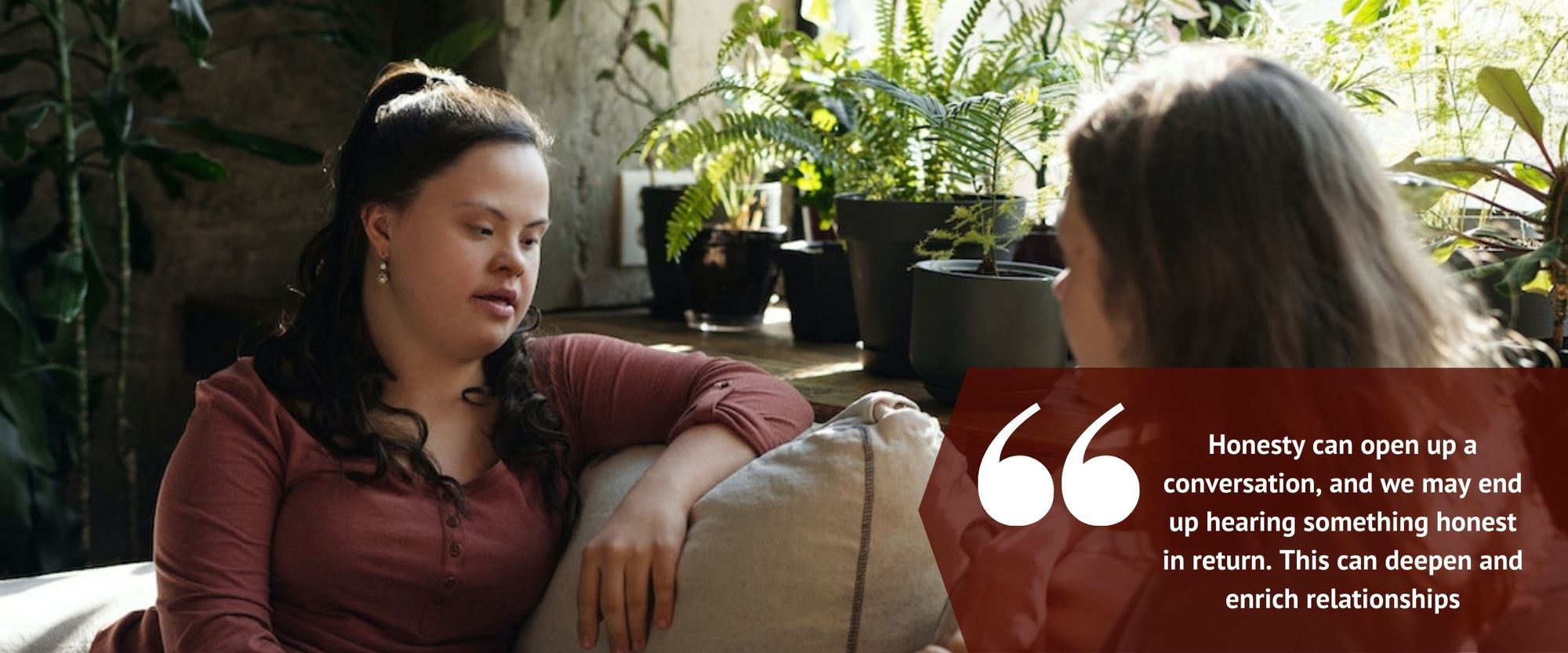
A little white lie never really hurts, right? Well, actually, telling fibs can impact your physical and mental health. Perhaps it’s time to embrace radical honesty instead?
In our society, we are used to telling white lies. Maybe you don’t want to go to a social event so you make up an excuse about being unwell, or if you don’t agree with someone you bite your tongue, and don’t share your true feelings.
This can help to keep the peace, but it can also get in the way of having real, authentic relationships with others. If you never express your true feelings, you might end up continually having someone crossing your boundaries, or doing things you don’t like but feel powerless to stop.
Research has also shown that repeatedly lying can cause stress, depression, and even physical illness. A US study from the University of Notre Dame, Indiana, looked at the effect of consciously trying to stop telling lies, including ‘white lies’, for 10 weeks. The results? Participants had fewer mental health issues such as low mood, and fewer physical health ailments such as headaches, than a control group that didn’t focus on lies.
This is something that Michelle Traub knows only too well. Michelle is a writer, compassionate coach, and author of Online Dating for Sensitive Women. Michelle says she ‘“grew up as a people-pleaser, telling people what they wanted to hear and being agreeable to keep the peace”. But it was only when Michelle completed a masters in Integrative Healing that she became aware of how this attitude was affecting her life.
"I realised it had led me to attract narcissistic and manipulative people, who used my kindness against me. My body started to turn on me by developing autoimmune diseases.My health decline began in my teens, as I started to experience chronic fatigue. My immune system continued to be under attack for more than a decade. All the while, I was unknowingly surrounded by narcissistic individuals, including a husband who consistently dismissed me and my beliefs. If I tried to speak my truth, I was shut down or overridden. I didn’t even realise what was happening."
When Michelle left her marriage, her health dramatically improved, and she attracted more healthy relationships based on honesty.
Not everyone has such dramatic consequences to suppressing their truth, and everyone’s situation is unique, but all of us can probably live more fulfilling lives by telling fewer lies. So, how can we do it?
Perhaps the first step is to become aware of the ways in which we lie. Many of us have been primed since childhood to be polite and please others, and perhaps in a pattern of telling untruths without being consciously aware of it.
One way to begin to notice is to check in with your body when conversing with others. Our bodies can house our stories and register what’s going on in our unconscious mind. Consciously, the lies might not register if you’re used to telling them, but your body might feel uncomfortable with what is happening, and the truth that is being suppressed.
Start to notice how your body feels in interactions with others. As you tell your boss it’s no problem to work late yet again, or you tell a friend that you’re happy to look after their child, what physical sensations do you feel? If you notice tension or tightness, butterflies in your stomach, shorter breaths, or a nervousness in your chest, it could be that your real truth is different to the one you’ve verbalised.

One way to bring conscious awareness is to keep a journal of all the times you catch yourself not being truthful. Judi Ketteler, author of Would I Lie to You? The Amazing Power of Being Honest in a World That Lies, kept an honesty journal to bring awareness to her lying.
Each time you catch yourself in a lie, write down how it made you feel. What were your thoughts or physical feelings? What are your fears around telling the truth in that particular situation? What are you losing by hiding your truth? How could you express yourself in a way that more genuinely reflects your inner mind?
The next step is to dive in and start being more honest about what you are thinking. One thing to bear in mind is that we may be lying because we do not want to hurt people.
Of course, honesty doesn’t mean being blunt and hurtful just for the sake of it, but means simply expressing your thoughts and feelings more accurately so your needs are met. This can be intimidating, especially if you are undoing a lifelong pattern of suppressing your truth. Marshall Rosenberg, the founder of the Center for Non-Violent Communication, referred to the concept of ‘scary honesty’ because of how terrifying it can feel.
A way to soften the blow of your honesty is to recognise the difference between what Marshall called ‘jackal’ and ‘giraffe’ honesty. Jackal honesty is a language of demands; blaming, criticising, judging, and demanding. Giraffe honesty is more clear-sighted; like a giraffe and its long neck, you can see the full picture, and recognise that thoughtful communication is clear and less likely to hurt others. With giraffe honesty, you can focus on observing, connecting, feeling, and requesting. So, if there’s something you need you can ask for it, and express why, rather than attacking the other person.
Using ‘I’ statements can help with giraffe honesty. When we use ‘I’ statements, we deliver our message with a focus on our feelings and beliefs, rather than our judgements on the other. For example: ‘I feel frustrated when I come home and the house is messy,’ as opposed to: ‘You always leave your mess lying everywhere.’
The last thing to be aware of is that being honest also means listening to what others have to say in response. Honesty can open up a conversation, and we may end up hearing something honest in return. This can deepen and enrich relationships in ways you might never have imagined. Modelling good honesty goes against our culture of white lies. It’s like a permission slip that lets others know that the times are changing, it’s OK to share what we really want and need.
The first time I heard a friend say to me that she couldn’t meet me because she was exhausted, emotional, and struggling, it was a relief. Instead of me wondering why she really cancelled, and if she really liked me, I knew that this was someone I could be close to, this was someone I could be true with. So, the next time I felt overworked and overwhelmed, I cancelled plans, feeling zero guilt.
Closeness can come from sharing our realness, rather than trying to always make the other person happy – and the more real we can be, the more genuine happiness we can cultivate, while inspiring others to do the same.
Visit Life Coach Directory for more information.

